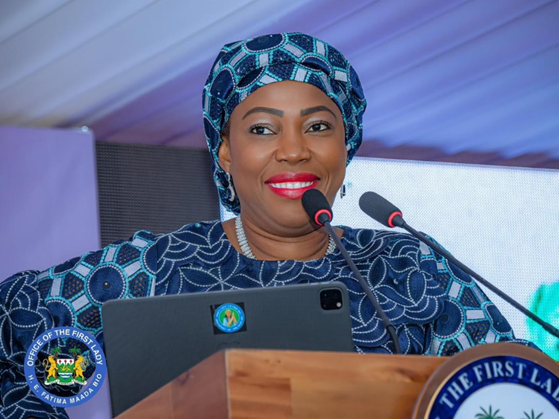By Mackie M. Jalloh
In a bold and unprecedented move to redefine women’s healthcare in Africa, Sierra Leone has emerged as a continental trailblazer with the establishment of the Uterine Health Fund (UHF)—a pioneering initiative that aims to spotlight and tackle long-neglected uterine health conditions affecting millions of women across the continent.
On July 25th, 2025, the country’s capital city Freetown witnessed a transformative moment in African public health policy as the First Lady of Sierra Leone, Dr. Fatima Maada Bio, officially inaugurated the UHF at the New Brookfields Hotel. Unlike conventional health interventions that often relegate women’s reproductive complications to the margins, the UHF brings uterine health to the center of medical discourse, financing, and care.
For too long, issues like fibroids, chronic pelvic pain, endometriosis, and excessive menstrual bleeding have been normalized or dismissed, leading to delayed diagnoses, unnecessary suffering, and economic hardship for countless women. Many endure years of pain without proper treatment—often due to cultural taboos, lack of awareness, or unaffordable healthcare costs.
The launch of the Uterine Health Fund seeks to address these long-standing gaps head-on. Through a holistic financing model that blends philanthropic contributions, public-private partnerships, and government collaboration, the fund will subsidize a range of services, from early screening to advanced surgical interventions. In its initial rollout, the UHF aims to provide comprehensive support to over 500 women, including full surgical treatment for at least 50 severe fibroid cases.
Fatou Wurie, a Sierra Leonean public health advocate and founder of the fund, has been instrumental in developing this groundbreaking initiative. Drawing on years of research, fieldwork, and advocacy, Wurie helped shape a system that does more than provide clinical services—it also collects data, informs policy, and strengthens public health accountability. One of the fund’s key innovations is the creation of a digital Uterine Health Registry, which will collect anonymized data on patient outcomes to help steer future reforms and medical investments.
Speaking at the launch event, Dr. Fatima Maada Bio described the UHF as more than a health project; she called it a “corrective justice measure” aimed at restoring dignity and visibility to women who have suffered in silence for generations.
“This is a personal mission and a national duty,” she declared. “We cannot continue to ignore what our mothers, sisters, and daughters go through simply because their pain is not spoken of. Uterine health must be integrated into maternal and reproductive health strategies—it is a matter of life, dignity, and equality.”
As the current President of the Organization of African First Ladies for Development (OAFLAD), Dr. Bio used the platform not just to launch the fund, but to issue a regional call to action. She urged African governments, international donors, corporate leaders, and philanthropic foundations to take uterine health seriously—both as a medical priority and a gender justice issue.
“The silence around these issues is not just cultural—it’s systemic. It’s reflected in how we budget, how we train our doctors, and what services are available to women. The Uterine Health Fund is about breaking that silence and building something new—something just,” she emphasized.
One notable feature of the UHF is the “Compassion Reserve”—a dedicated pool of resources within the fund that helps cover transport, medication, and partial surgery costs for women who may otherwise be excluded due to poverty or remote location. This emphasis on equity and access ensures that even the most vulnerable women benefit from the initiative.
While the fund begins in Sierra Leone, its ambitions are continental. Through OAFLAD and other partnerships, the First Lady hopes to use the success of the UHF as a model for similar interventions in other African countries. By tracking real-time health outcomes and leveraging strategic communications, the fund also aims to destigmatize discussions around uterine health—encouraging women to seek care earlier and policymakers to allocate resources more equitably.
For Fatou Wurie, launching the fund in Sierra Leone holds both symbolic and practical significance.
“This is where I was born. This is where I saw women suffer in silence. And this is where we begin to change that story,” she said.
The reception from the public and development partners has been overwhelmingly positive. Health professionals have praised the initiative’s emphasis on early diagnosis and its data-driven approach. Women’s rights groups have lauded it as a rare moment where policy aligns with lived experience.
Indeed, Sierra Leone’s move stands in stark contrast to global health trends, where funding for uterine and menstrual health often lags far behind other health priorities. The UHF signals a new direction—one where women’s unique health needs are no longer treated as optional, but foundational.
As Sierra Leone sets the tone for this new era in reproductive healthcare, the UHF not only responds to urgent medical needs but also affirms a deeper principle: that every woman, regardless of income or geography, deserves to live free from avoidable pain and untreated illness.
With this initiative, the country is not merely launching a health fund—it is igniting a movement. A movement rooted in justice, powered by compassion, and guided by the firm belief that a woman’s health is not a luxury—it is a right.



